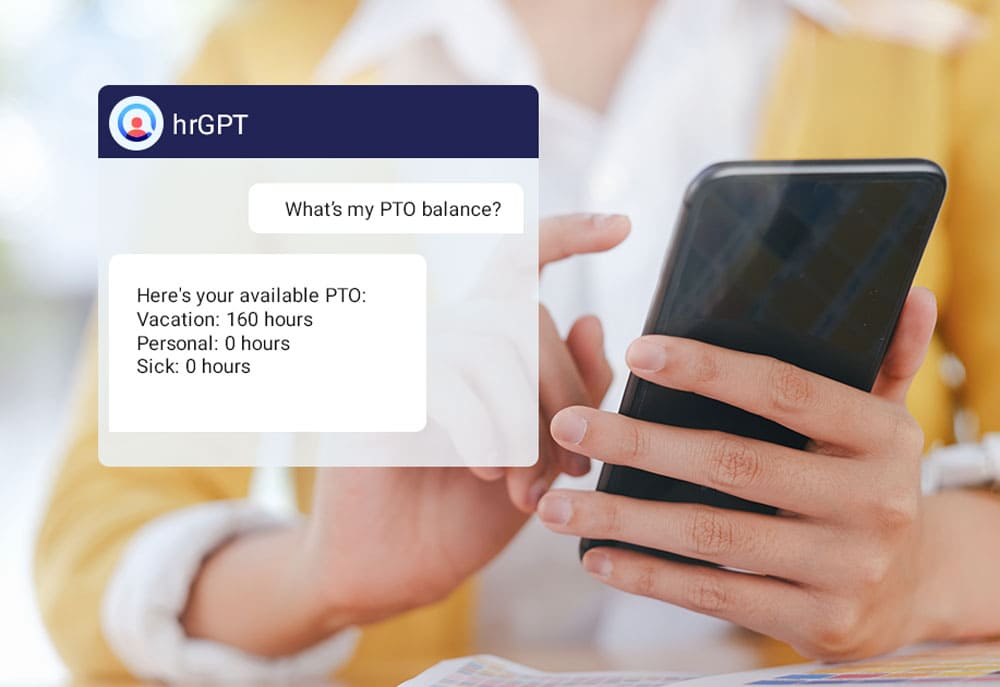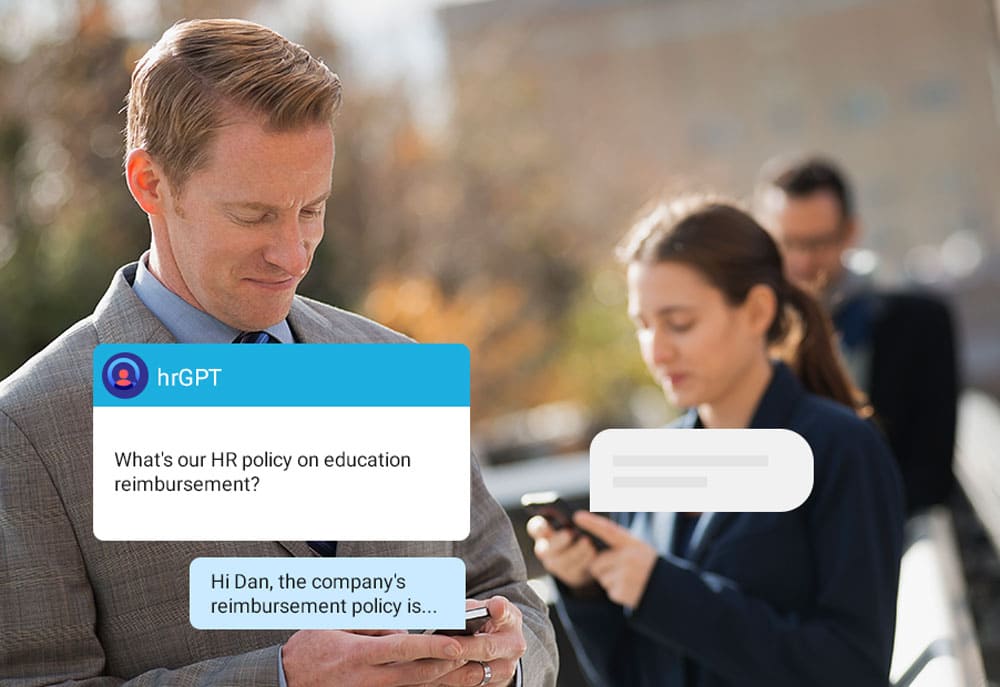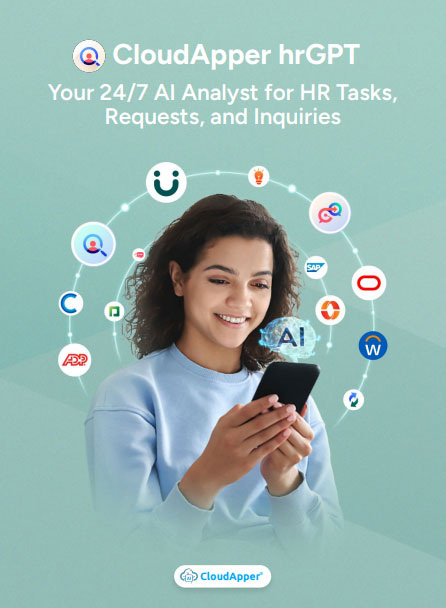CloudApper hrGPT enhances HR efficiency by automating tasks, providing real-time insights, and personalizing employee support. It addresses ethical concerns like privacy and bias while improving decision-making and engagement.
Table of Contents
AI assistants in HCM have the aim to automate regular HR operations, provide real-time insights, and help with decision-making processes. These automated systems can execute a wide range of services, including recruitment, onboarding, training, performance management, and employee engagement. AI assistants can communicate with employees, answer questions, and provide personalized help using machine learning and natural language processing, increasing overall productivity and pleasure.
Key Takeaways
AI assistants improve HR productivity by automating routine processes, allowing professionals to focus on strategic objectives. They offer real-time, data-driven insights to help decision-makers and solve ethical concerns like privacy, bias, transparency, and employment effect. Personalized employee support boosts the experience and engagement, while seamless connection with existing HR systems assures smooth operation and increases overall efficiency.
Ethical Considerations
The use of AI assistants in HCM is also driven by several ethical considerations, including:
Privacy and Data Security
AI systems handle massive amounts of personal data, creating questions about how it is acquired, kept, and used. Effective data security measures and compliance with privacy requirements must be ensured to protect employee information.
Bias and Fairness
AI algorithms can unintentionally propagate inequalities in the data they are trained on. It is critical to conduct regular bias audits on AI systems and implement procedures to ensure that all employees are treated fairly.
Transparency and Accountability
Organizations must be open about how AI systems make decisions and assure accountability for the results. Clear documentation and explainable AI models can help you comprehend the decision-making process.
Employee Consent and Autonomy
Employees should be educated about the use of AI in the workplace and given the opportunity to agree to its use. Maintaining employee autonomy and ensuring that AI does not interfere with human decision-making is crucial.
Impact on Employment
The automation of HR processes using AI raises worries about employment displacement. Organizations must address these concerns by concentrating on improving the skills of their employees to work with AI technologies.
Success Story
A technology company used CloudApper hrGPT to upgrade their HR operations. The AI assistant automated common processes like payroll and attendance tracking, resulting in a significant reduction in administrative workload. Real-time analytics provided HR managers with vital insights into employee performance and engagement. This resulted in a 25% increase in total HR efficiency and a 15% boost in employee satisfaction. The custom assistance provided by hrGPT also improved the onboarding process, making new workers feel more welcome and supported, resulting in increased retention rates.

Description and Features of CloudApper hrGPT
CloudApper’s hrGPT is an excellent AI assistant tool for human capital management. This AI-powered HR assistant uses advanced AI capabilities to simplify HR operations and boost employee engagement.
Automated HR Processes: hrGPT automates regular HR operations, including employee onboarding, payroll management, and performance tracking, allowing HR professionals to focus on strategic projects.
Individualized Employee Support: Using natural language processing, hrGPT interacts with employees, answers their questions, and offers individualized support, thereby improving the entire employee experience.
Real-time Insights: The AI assistant provides real-time statistics and insights, allowing HR managers to make data-driven choices.
Seamless Integration: hrGPT interfaces smoothly with existing HR systems, resulting in a smooth transfer and consistent workflow.
Benefits for HR Professionals
CloudApper hrGPT can provide substantial benefits to HR professionals in the following ways:
Efficiency: By automating repetitive operations, hrGPT minimizes the administrative burden on HR professionals, freeing them to focus on strategic functions.
Enhanced Decision-Making: hrGPT’s real-time insights and analytics empower HR professionals to make more data-driven decisions.
Improved Employee Engagement: hrGPT’s personalized support and timely assistance boost employee satisfaction and engagement.
Cost Savings: These are achieved by the automation of HR procedures, which reduces the need for considerable manual intervention.

Conclusion
The use of AI assistants such as CloudApper hrGPT in HCM provides multiple benefits, including increased efficiency, better decision-making, and higher employee engagement. However, enterprises must address the ethical concerns around AI adoption, such as privacy, bias, transparency, and the impact on employment. By doing so, organizations may ethically use AI and ensure a good influence on their workforce. Contact CloudApper to understand how AI can improve your HR procedures, increase productivity, and encourage worker satisfaction.
FAQs
1. What is an AI assistant in HCM?
An AI assistant in HCM automates HR activities, gives real-time information, and helps with decision-making.
2. How does CloudApper hrGPT improve HR processes?
It automates processes, gives real-time analytics, and customizes staff support.
3. What are the ethical considerations around AI in HCM?
Privacy, bias, transparency, employee permission, and job displacement are all critical ethical problems.
4. Can artificial intelligence assistants replace human resources professionals?
AI assistants are intended to supplement, not replace, HR workers by completing regular tasks and giving insights.
5. How many HR professionals benefit from CloudApper hrGPT?
By increasing efficiency, improving decision-making, boosting employee engagement, and lowering expenses.
What is CloudApper AI Platform?
CloudApper AI is an advanced platform that enables organizations to integrate AI into their existing enterprise systems effortlessly, without the need for technical expertise, costly development, or upgrading the underlying infrastructure. By transforming legacy systems into AI-capable solutions, CloudApper allows companies to harness the power of Generative AI quickly and efficiently. This approach has been successfully implemented with leading systems like UKG, Workday, Oracle, Paradox, Amazon AWS Bedrock and can be applied across various industries, helping businesses enhance productivity, automate processes, and gain deeper insights without the usual complexities. With CloudApper AI, you can start experiencing the transformative benefits of AI today. Learn More

CloudApper AI Solutions for HR



- Works with








- and more.
Similar Posts

Best Practices for AI in Workforce Management: What Every HR…

Why HR Process Automation is the Future of Workforce Management






